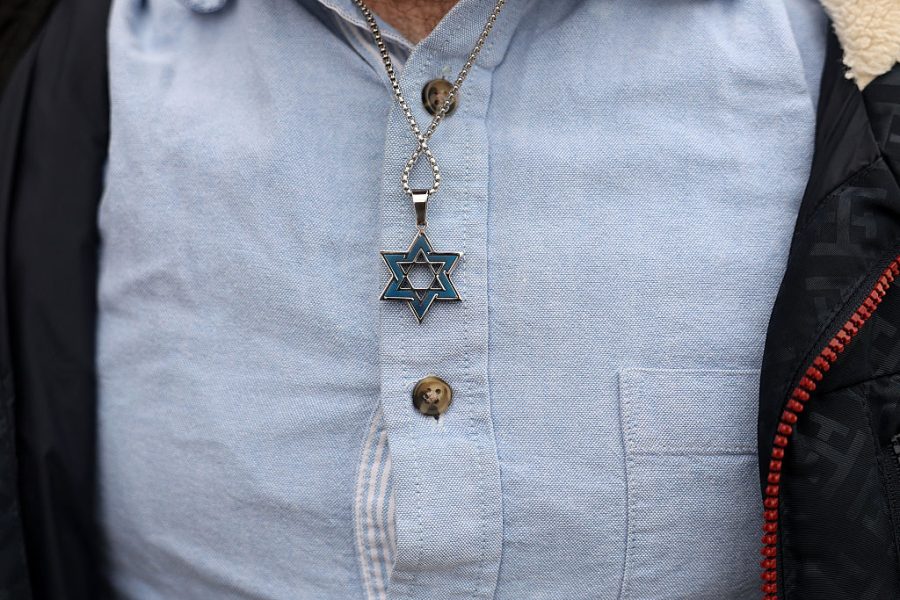Amid the grim fluorescence of a police interview suite, a glimpse of where we are and where we are heading. The place is Hammersmith police station, the date August 30, and the time a little after 2 a.m. An unnamed lawyer in his 40s, whom we are told is Jewish, has been detained for allegedly repeatedly entering an area set aside for anti-Israel protestors.
He was there, he says, as an independent legal observer and was documenting a demonstration outside the Israeli embassy in Kensington and the police response thereto. Since October 7, 2023, Jewish and pro-Israel groups have grown concerned at the Metropolitan Police’s handling of pro-Palestine marches. This police interview is hardly likely to reassure them.
Jewish groups have grown concerned at the Metropolitan Police’s handling of pro-Palestine marches. This interview is hardly likely to reassure them
In the video obtained by the Telegraph, the interviewing officer alleges the suspect got ‘very close’ to pro-Palestine protesters and that his actions went ‘beyond observing to provoking’. He can then be heard asking the suspect: ‘What necklace are you wearing?’ The suspect, flustered, explains that it’s a Star of David.
His solicitor objects to the question and, after a brief pause, the interview continues. The constable says he was not intending to offend, but was reflecting the fact that fellow police officers had ‘noted in their statements that because the Star of David was out and present to people… they felt that was antagonising the situation further’.
The suspect’s solicitor tells the detective this is ‘appalling’, pointing out that the Star of David could hardly have been antagonising to the protestors: the demonstration was organised by an anti-Zionist Jewish group. Why would the symbol of Judaism upset them?
The officer insists he doesn’t ‘want this to become a political debate in an interview’, before calling the demonstration ‘a hostile environment where pro-Palestinian protesters are obviously objecting to what is happening in Israel and Gaza’. He then asks the suspect: ‘Do you see how that [the Star of David] could be an antagonistic emblem or sign… to people in that environment?’
In all, the suspect spent almost ten hours in custody and remains on bail. He has accused the Metropolitan Police of ‘trying to criminalise the wearing of a Star of David’. Officers have stressed that he wasn’t arrested for that but for a public order offence of allegedly ‘getting very close to protesters to film them and in doing so provoking a reaction’.
The man calls his arrest ‘one of the clearest examples of two-tier policing’, adding: ‘Police are arguing that wearing a Star of David is antagonising to protesters while we have seen all manner of anti-Semitic slogans on placards and shouted at Jews that have gone unpunished.’ Gideon Sa’ar, Israel’s Foreign Minister, has called the Met’s actions ‘a moral disgrace’ and proof that ‘rampant anti-Semitism’ had ‘poisoned the streets’ of Britain.
Poisoned the streets and poisoned those tasked with policing them. It seems outrageous that arresting officers would bring up a suspect’s religious apparel in an arrest statement when it is entirely irrelevant to the reason for that arrest. It would be one thing if this had been an off-the-cuff remark, but when police officers are prepared to put such thoughts in writing, well-aware of the scrutiny applied to such formal documents, it tells us something about the professional culture in which they operate.
It says that officers who have been trained to avoid victim-blaming in other circumstances feel comfortable intimating that a Jew making known his Jewishness is asking for trouble. It is outrageous, too, that a detective would pursue a line of questioning that suggested there was something provocative about a Jew wearing a modest Star of David pendant. It seems we are very much in the realm of: ‘Well, you were wearing that miniskirt, love.’
What do we think would happen if the police had behaved the same way with, say, a Muslim woman? She turns up at a pro-Israel rally in her hijab seeking to document the activities of protestors. The police arrest her and an interviewing officer suggests her head covering is ‘antagonistic’. How long do we reckon it would take between the video hitting social media and the Met commissioner issuing a grovelling apology and sending half the force on Islamophobia awareness training?
The hijab hypothetical would never happen because the police are scared of Muslims. Not the majority of Muslims who cause no trouble for anyone but that minority who take to the streets to protest offence, and sometimes attempt to intimidate, as seen with the Batley Grammar teacher who was hounded after showing a picture of the Prophet Muhammad, the schoolpupils who scuffed a copy of the Quran in Wakefield, and the mobs who forced The Lady of Heaven film out of British cinemas in 2022.
Muslims who wish to bully authorities into submission have the implicit threat of public disorder or violence. Wouldn’t want a Charlie Hebdo attack on your hands, would you? Jews have no such calling card attacks in the West to demonstrate the consequences of failure to bow to their demands.
The experience of Jews in Britain is an object lesson in the brutal realities of a multicultural democracy. The more law-abiding, productive, and integrated a demographic, the more likely it is to face mistreatment by institutions of the state.
The primary duty of the state is not the protection of its citizens but the maintenance of the illusion of harmony in a country where thuggishness prevails. Jews, on the whole, are not thuggish. They pose no threat. They have no power.
You can arrest them, you can interrogate their religious apparel, you can call the Star of David ‘antagonistic’, and no mob will come for you. This is where we are and where we’re heading.








Comments